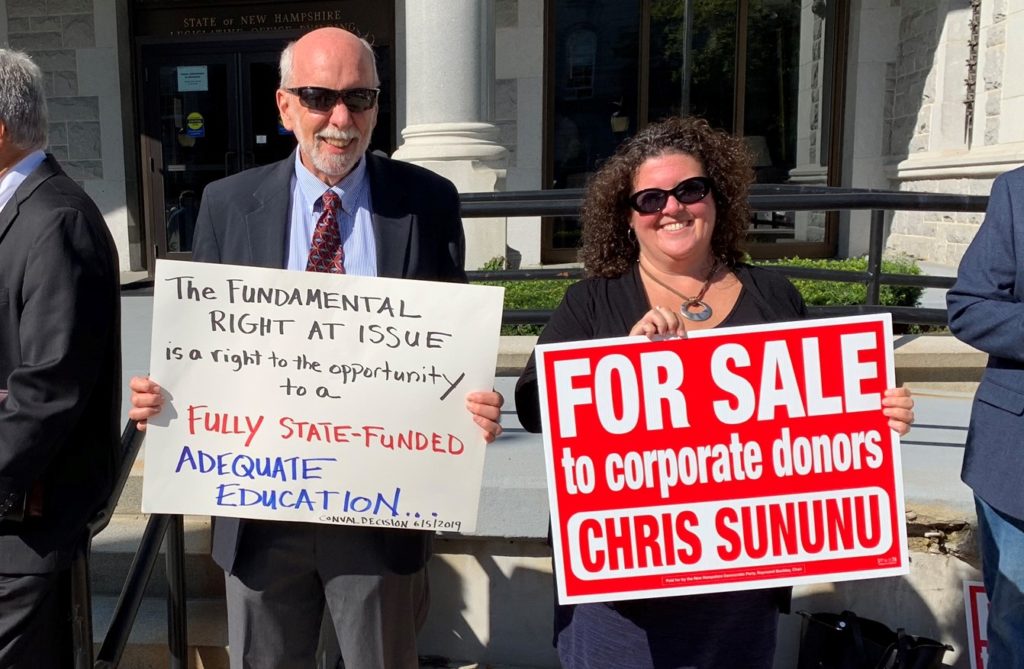NEA-NH President, Megan Tuttle, testified along with scores of others during the State House Public Hearing on the Effects of the Continuing Resolution (for the Budget) on the Department of Education. Her comments appear below.
“Good morning. My name is Megan Tuttle and I am president of NEA-New Hampshire.
As the school year begins again, our members are back at work making sure the success story that is within every child has a chance to be discovered and come to life.
Our public schools instill and nurture a great sense of community, offer a wide array of educational choices, have a deep commitment to success of all our students, and consistently rank among the best in the country. New Hampshire’s educators are dedicated professionals – more than two-thirds of our classroom teachers have obtained their master’s degree or beyond.
Our members can be found in almost every community across the state. NEA-NH represents 12 in every 100 Granite Staters and one in every 39 voters come from an NEA-NH household. This state’s educators are trusted and powerful voices in our community.
Make no mistake – Governor Sununu’s veto is his education plan for New Hampshire. Namely, to continue to cut and underfund public education while propping up large out-of-state corporations with tax breaks they did not ask for.
Governor Sununu is manufacturing a crisis. We have children sitting in classrooms right now and educators working in schools with districts not knowing how much aid they will receive from the state.
Chris Sununu promised to be the education governor while campaigning. A promise he has broken many, many times now.
Since taking office he has done everything in his power to curry the favor of wealthy CEO’s and balance the state budget on the backs of our public-school children and property taxpayers.

New Hampshire has failed to provide stable, equitable and truly adequate funding for our public schools for decades, as leaders like our Governor put rich corporations ahead of students and property taxpayers, and set education budgets without knowing how much it actually costs to educate kids.
As every parent and educator knows, the very last thing we should be doing is decreasing school funding. The most recent overviews of the research on education spending found that more money to schools consistently meant better outcomes for students — higher test scores, higher graduation rates, and sometimes even higher wages as adults. Our economy depends on a well-educated, high-quality workforce and that means investing in our students. Investments in students are investments in their future and ours.
This budget was a win for students, educators and property tax payers.
This budget would have helped us deal with many of the shortcomings that result from chronic underfunding. When kids enter school, they are not all at the same starting line. Each day, we try our best to bridge that gap. Funding helps.
As educators and parents, we believe teaching and caring for the whole child means a student:
• Enters school healthy and learns about and practices a healthy lifestyle.
• Learns in an environment that is physically and emotionally safe for students and adults.
• Engages in learning and is connected to the school and broader community.
• Gains access to personalized learning and is supported by qualified, caring adults.
• Is challenged academically and prepares for success in college or further study and for employment and participation in a global environment.
Our Governor’s preference for CEO’s over students made it exponentially more difficult for our schools to achieve these goals.
The growing crisis around students’ mental health, and the scarcity of available care, has long been a concern of many educators and health professionals, but funding to address this need is only now making its way into the legislative agenda. This budget would have had a positive impact on our ability to work with students. The Governor said corporations were more important.
Gov. Sununu said he vetoed the state’s proposed budget because of he favors supporting business tax policy for large, out-of-state corporations, and because he believes no one has sufficiently demonstrated how the budget’s education funding increases will directly “get more” for the state’s dollar.
Please hear my 17,000 members collectively asking “is he serious?”
Governor Sununu does not have to use his own money to purchase pens, paper and other supplies for his office.
He does not have to spend his own money to buy food for staff members who are homeless,
Or find ways for them to do their laundry so they don’t return day after day in the same unhealthy clothes.
Or start go fund me pages to buy jackets, mittens and boots because winter is coming,
Or find ways to ensure learning continues during extended absences because their living conditions are dependent on their caretaker’s incarceration or rehabilitation.
Vetoing this budget hurt kids and communities in a profound way.
We urge you to override this veto. And short of that, to replace as much education funding as you can.
Particularly in light of the fact that the state is now receiving a $46 million dollar grant for charter schools which could free up some money for public schools.
As educators, it is our duty to advocate on behalf of our students and their families. Be assured that we will remain active participants in the process that ultimately determines the funding that shapes our children’s future.”
